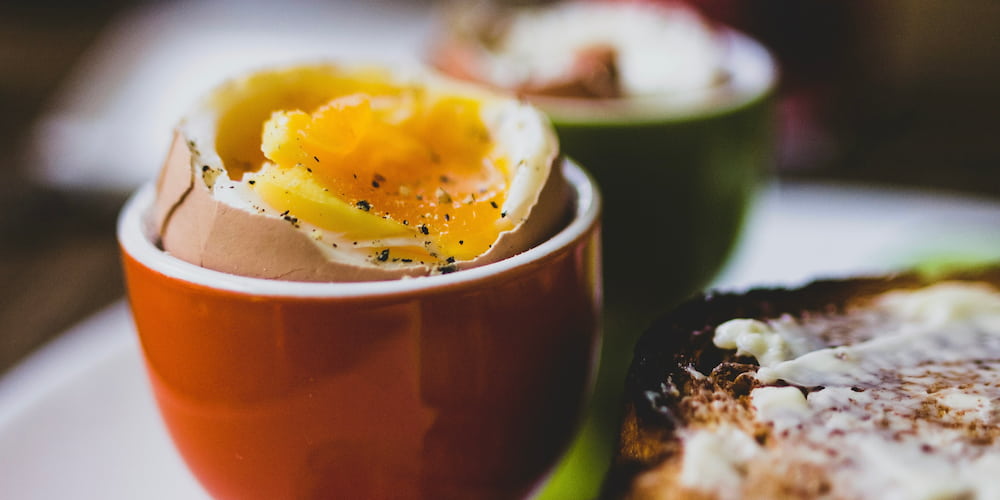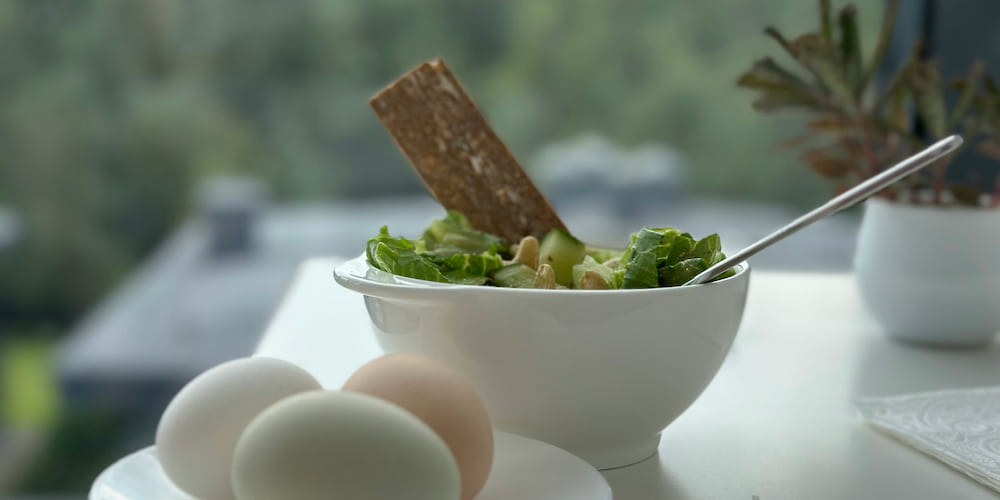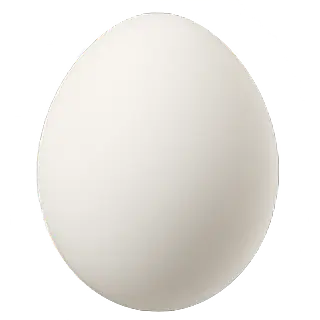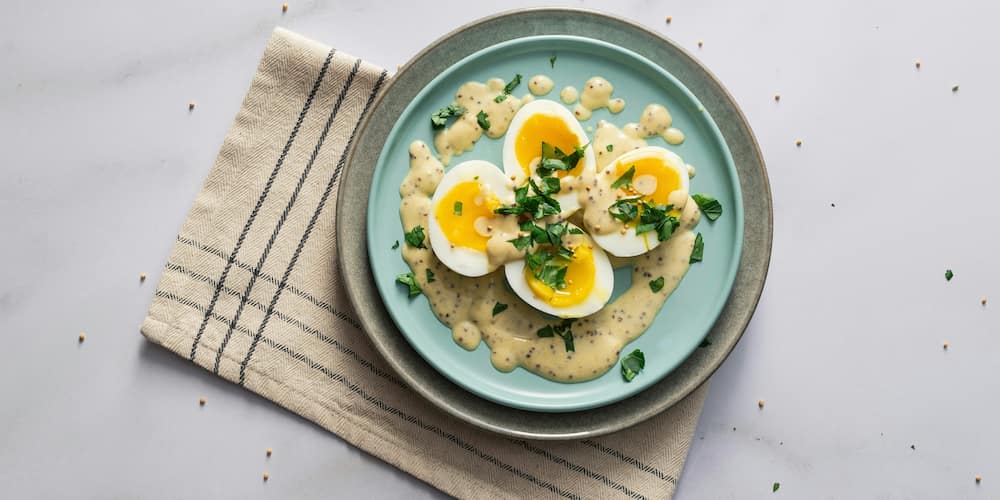Wondering how to cook the perfect soft-boiled egg?

Cooking soft-boiled eggs might seem like a simple task, but getting the perfect result involves a few important details. If you've ever wondered how to cook eggs so that the yolk remains runny and the white is firm, this article is for you. Here, we'll thoroughly discuss how long to boil soft-boiled eggs, the best way to manage the process, and how to use a timer to consistently achieve perfect eggs. Our handy timer on the website will help you cook your soft-boiled eggs exactly the way you want, whether for breakfast, as a salad topping, or as a standalone dish.
How long should you boil eggs?
The key to perfect soft-boiled eggs lies in the cooking time. To achieve the ideal consistency, it's crucial to understand the exact time needed for different levels of doneness. Below, you’ll find a detailed table outlining the cooking times for various types of boiled eggs. Note that the timer should start from the moment the water begins to boil. This guide will help you use our timer effectively by setting it to the precise time needed for your desired egg texture. Whether you’re aiming for a runny yolk or a firmer consistency, simply adjust the timer according to the table. For even greater precision, you can customize the timer down to the second to ensure your eggs turn out perfect every time.
| Cooking Time (Minutes) | Degree of Doneness |
|---|---|
| 3 minutes | Soft-boiled with a runny yolk |
| 4 minutes | Soft-boiled with a slightly firmer yolk |
| 5 minutes | Medium-soft boiled with a creamy yolk |
| 6 minutes | Medium-boiled with a slightly firmer yolk |
| 7 minutes | Medium-boiled with an almost set yolk |
| 9 minutes | Soft-hard boiled with a tender yolk |
| 10 minutes | Firmly cooked with a tender yolk |
| 12 minutes | Fully hard-boiled with a firm yolk |
Different methods for cooking boiled eggs
Proper preparation and choice of cooking method are crucial for achieving the perfect boiled egg. In this section, we will explore how to properly prepare eggs before cooking, how to time the cooking process, and tips to ensure excellent results whether you use a stove, slow cooker, or microwave. Discover why adding salt can be beneficial, the importance of cooling eggs after cooking, and additional tips for perfect eggs.

Preparation Recommendations
Before boiling, rinse the eggs under cold water to remove any impurities. Place the eggs in your chosen container and add enough water to fully cover them. Adding a bit of salt to the water helps prevent the shells from cracking and makes peeling easier later. After cooking, it is recommended to transfer the eggs to cold water to stop the cooking process and facilitate peeling.
- On the Stove:
Place the eggs in a saucepan filled with cold water and add a pinch of salt. Set the pan over medium heat and bring the water to a boil. Once boiling, reduce the heat and cook the eggs for the desired amount of time based on your preferred level of doneness. After cooking, transfer the eggs to cold water to stop the cooking process.
- Passive Cooking Method:
Bring the water with the eggs to a boil, then turn off the heat and cover the pot. Let the eggs sit in the hot water for 10-12 minutes. The eggs will continue to cook in the residual heat, which can result in a softer white and a less firm yolk. After the time has elapsed, place the eggs in cold water to stop the cooking process.
- In a Slow Cooker:
Place the eggs in a steaming basket or directly in the bottom of the slow cooker, adding a small amount of water. Select the “Steam” or “Cook” mode and set the timer for 5-10 minutes, depending on your desired level of doneness. Once cooked, transfer the eggs to cold water to stop the cooking process.
- In the Microwave:
For microwave cooking, use special egg cooking containers if available. If not, place the egg in a mug, cover it with water, and cover with a plate. Set the microwave to 50-70% power and cook the egg for about 5-7 minutes. After cooking, cool the egg in cold water.
Be careful as the egg may burst unpredictably.

Fact
Did you know that hard-boiled eggs can be stored in the fridge for up to a week and retain all their beneficial properties? However, to retain maximum benefits, it is best to consume them within the first three days of cooking.
Useful Tips and Hacks for Boiling Eggs

Boiling eggs might seem straightforward, but there are several tips and tricks that can make the process easier and the results better. Here are some practical tips and hacks to help you achieve the perfect boiled eggs every time.
- Easy Peeling:
To make peeling boiled eggs easier, add a teaspoon of baking soda to the boiling water. The baking soda increases the pH level of the water, which helps to loosen the egg whites from the shell. Another tip is to use slightly older eggs rather than fresh ones, as they are easier to peel.
- Cooking Quail Eggs:
Quail eggs are a delightful addition to many dishes, and they cook quickly. For soft-boiled quail eggs, place them in boiling water for about 2 minutes. For hard-boiled quail eggs, cook them for 4 minutes. Due to their delicate nature, it is best to place them in cold water immediately after boiling to prevent overcooking.
- Storing Boiled Eggs:
Boiled eggs can be stored in the refrigerator for up to one week. If you plan to keep them for more than a couple of days, it’s best to leave the shells on to prevent them from drying out. Store them in a covered container to maintain freshness. If you’ve peeled them, place a damp paper towel in the container to keep the eggs from drying out.
- Preventing Cracks:
To prevent eggs from cracking while boiling, start with eggs at room temperature and add them to the water gently. Another effective method is to use a pin to make a small hole in the rounded end of each egg before boiling. This can help to release pressure and prevent cracks.
Common Questions
Below are some common questions about boiling eggs, covering essential tips and practical advice to help you get perfect results every time.
How long should you boil eggs for a soft-boiled result?
For soft-boiled eggs, boil them for 4-6 minutes. This will give you a runny yolk and a set white. Adjust the time slightly depending on your preference for the yolk's consistency.
What is the best way to store hard-boiled eggs?
Hard-boiled eggs can be stored in the refrigerator for up to one week. It's best to keep them in their shells to maintain freshness and prevent odors from penetrating.
How do you cook soft-boiled eggs to perfection?
To cook soft-boiled eggs, start by boiling them for 3-4 minutes. Then transfer them to an ice bath immediately to stop the cooking process and make peeling easier.
Is it necessary to wash eggs before boiling?
It's a good idea to rinse eggs under cold water before boiling to remove any surface dirt. However, avoid washing them too much as it can remove the natural protective coating on the shell.
How can you test the freshness of eggs?
To test egg freshness, place them in a bowl of water. Fresh eggs will sink and lay flat on the bottom, while older eggs will stand upright or even float.
Can you boil eggs in the microwave?
Yes, you can boil eggs in the microwave using a special egg cooker or by placing them in a cup of water. Microwave on medium power for about 5-7 minutes, then cool them in cold water.
What can you do to prevent eggs from cracking during boiling?
To prevent eggs from cracking, start with cold water and gradually heat it to boiling. Additionally, you can prick a small hole in the egg's shell before cooking to help prevent cracking.
Similar timers
Select the timer best suited for your purposes:
- 10-hour timer with sound. Manage long tasks with our customizable and free online timer.
- 30-minute timer with alarm. Streamline your tasks with this easy-to-use timer.
- How long to cook shrimp? Use the timer to make juicy shrimp.
- 1 minute timer. Free online 1-minute timer with sound signal.
- How long to cook mushrooms? Set up and start a timer to cook the specific type of mushrooms you need.
- Free 5-second timer. Simple, convenient, and modern 5-second timer with beep.
- How long to cook crayfish? The timer will help you keep track of the cooking time for crayfish.

